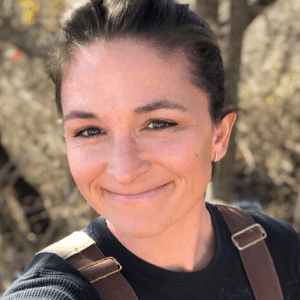A note from Abigail Ryder, Program Director, Rethink Events: We’re looking forward to a lively debate at the World Agri-Tech Innovation Summit as Meredith Ellis adds the farmer’s voice to a key discussion about how agriculture can be part of the climate change solution. Here, she shares not only her passion for ranching but also how farmers are working holistically with tech providers and food companies to effect positive change in environmental ecosystems.
As a second-generation rancher on her family’s ranch in Texas, Meredith Ellis can tell you that it’s a tough time to be a livestock producer. Although some outlets are pinpointing meat production as the primary culprit behind climate change, Ellis and other ranchers are quickly firing back with a laundry list of points that are often left out of the conversation.
“Farming is often seen as this beautiful thing with a woman wearing coveralls and holding a basket while picking heirloom tomatoes,” Ellis told AFN. “I wish that paradigm would shift and people would think of a ranch as a national park. One of our pastures has hundreds of species of grasses, plants, wildflowers, and trees. My job is to manage this land by using processes that mimic nature and the outcome is that we get to eat beef.”
Ellis will be speaking on a panel entitled “Climate + Agriculture: How do we Make Agriculture Part of the Climate Change Solution?” at the World AgriTech Innovation Summit in San Francisco on March 18. She will be joined by a diverse crew, including representatives from General Mills, The Nature Conservancy, Pivot Bio, and Finistere Ventures, highlighting the cross-industry interest in figuring out whether food production has a role to play in improving the climate situation.
The family ranch, G Bar C Ranch, has been involved with the Noble Research Institute for two decades and is currently involved in its Land Stewardship Program. The goal of the program is to quantify the ecologic and economic benefits of managing land with a stewardship ethic and to help producers understand the ecosystem services that they can provide. The program then positions producers to participate in ecosystem services markets as they develop and become available. Ellis also sits on the board of Noble’s Integrity Beef Alliance, which provides strict protocols for herd health, responsible management, and genetics.
The connection between managed grazing and the ability to sequester carbon, has led to more buzz about the potential for farmers to get paid to generate carbon offset credits. In Montana, for example, the Western Sustainability Exchange is helping farmers with the upfront cost of adopting different grazing management practices that improve sequestration by providing them with a way to sell carbon credits. Boston-based agtech startup Indigo Agriculture is also getting into carbon credits, by trying to get food companies and other carbon emitters to pay farmers to store carbon in their soils using regenerative agriculture practices via its Terraton Initiative.
Last year, Noble teamed up with ADM Bunge, Cargill, General Mills, Indigo Agriculture, McDonald’s USA, Noble Research Institute, Soil Health Institute, and The Nature Conservancy to establish the Ecosystem Services Market Consortium. The program is aiming to launch a functional ecosystem services market by 2022 that lets farmers and ranchers who add conservation practices to improve soil health, water usage, and GHG emissions to get paid for their efforts.
Ellis’s ranch has been involved in the pilot project to develop ESMC.
“Along with 13 other ranches, they’ve been taking core samples to measure carbon sequestration, obtaining metrics on water quality and the quantity that we push downstream as well as biodiversity. Those numbers will turn into dollar signs for ranchers, which turn the industry’s eyes from thinking about selling pounds of beef to thinking about other things that we can provide. The incentive could be revolutionary and a real game-changer,” she says.
Ellis is a fan of grass-finished beef. Although the family currently sells calves into the conventional beef supply chain to be finished in a feedlot, they recently held back three steers and are experimenting with what a grass-finishing program would look like on their ranch. Although she likes the idea of “breaking up with the system” and selling grass-finished meat direct-to-consumer, she doesn’t want to give up on her greater vision.
“I would like it if we could make an industry-wide impact instead of taking my 48,000-pounds of beef and marketing it.”
Technology in ranching
Although much of agri-foodtech’s momentum has focused on other segments like commodity crop production, food safety, and food waste, the next generation of livestock producers’ tech-centered habits may help close the gap. On her farm, Ellis is fascinated with any opportunity to use technology particularly if it can lead to improvements.
“Give me all the technology. The system I use is really clunky and scattered among apps. I have a lot of Excel spreadsheets. A lot of my documentation is emails to myself,” she says.
She also sees opportunities for technology to enable problem-solving across the broader ranching segment, which can be a lonely vocation. Like row crop operations, ranches can span tens of thousands of acres in rural communities with humble populations.
“Sometimes I feel like someone needs to know about the endangered plant on my ranch and I don’t know who to contact. I say in my dream world where money was no object, it would be great to have some kind of open-source software or cloud location for everyone in the industry to upload their data. I could upload all my iNaturalist plant identifications and the genetics of my cows and records and researchers could also upload their findings.”
Find out more about the session Meredith Ellis will speak on at World AgriTech Innovation Summit and the rest of the agenda here. Tickets are selling fast, so don’t miss out!





